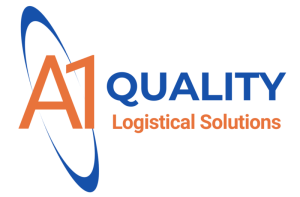A1 Quality Logistical Solutions

- By Haley
- July 24, 2025
Table of Contents
Key Highlights
- Perishable room cleaning is essential for maintaining efficiency in supply chain operations, enhancing customer satisfaction, and ensuring proper inventory management.
- Understanding the role of perishable rooms helps in optimizing warehouse space and ensuring accurate order fulfillment processes.
- Regulatory compliance in the United States demands strict adherence to sanitation and hygiene standards for perishable storage areas.
- Challenges like temperature control, cross-contamination, and pest issues require specialized cleaning practices.
- Advanced tools, cleaning agents, and automation are transforming cleaning protocols for perishable storage zones.
- Customized solutions for dairy, meat, banana, and other perishable zones help maintain product quality and enhance customer experience.
Introduction
In the fast-changing world of supply chain management, keeping warehouses that store perishable items clean is very important. Perishable room cleaning is a big part of protecting the quality of your products. It helps with customer satisfaction and makes sure your operations are smooth each day. These rooms hold things like dairy, meat, and bananas, so strict cleaning and hygiene rules are a must. When you improve your warehouse cleaning, you protect your supply chain inventory and help order processing go well. In the end, this leads to better customer satisfaction and a stronger supply chain.
Understanding Perishable Room Cleaning
Perishable room cleaning is a key part of warehouse cleaning. It helps keep sensitive products in the right condition. These rooms hold items like dairy, meats, and fruits that need to be stored with great care.
Using trusted warehouse cleaning services keeps these rooms free of dirt or other harmful things. This also helps with inventory management because it lowers spoilage and helps items last longer. When the perishable room is clean, it helps the supply chain run smoothly. This way, there will be fewer problems in getting goods from the warehouse to where they need to go.

What Are Perishable Rooms?
Perishable rooms are special areas in a warehouse. These rooms are made to store products that need temperature, humidity, or light to be just right. Items like fresh fruit, dairy, meat, and other goods that spoil need the right conditions in this space.
These rooms in a warehouse work to keep the best settings for every product. They be planned to stop food from going bad and help things stay fresh for a longer time. By taking care of things like temperature and how air moves, these areas make warehouse space more useful.
Having perishable rooms as part of larger warehouse operations is key for a good supply chain. Setting up space in the warehouse the right way keeps different kinds of products safe and simple to handle. To make sure logistics services are strong, these rooms need to be checked often. They give the right storage to support sensitive items and help the warehouse do well.
Why Cleanliness Is Critical in Perishable Storage
Cleanliness in places where you store items that can go bad is about more than just being clean. It is important for proper sanitation and for the whole supply chain. A clean storage space helps keep your goods in good shape and makes them last longer. This way, the customer experience is always good and never takes a hit.
When you do not have good sanitation, there is a higher chance that health and work get hurt. Dirt can bring in things that ruin products. A clean warehouse keeps people safe and also helps with order fulfillment by making sure orders are packed right. This means there is less chance for things like delays from items getting damaged or spoiled.
Also, when you keep everything clean, your brand looks better. It shows you care about quality and keeping things safe. Your products will match what people look for and follow the right rules. If you make sanitation part of daily work, your warehouse will stand out as a strong, steady part of the whole supply chain.
Regulatory Standards and Compliance in the US
In the United States, businesses that store perishables must follow strict rules. These rules keep food safe, help stop contamination, and protect the public’s health.
Working with commercial cleaning services that know about U.S. laws can make it easier to follow these rules. There are many rules like the FDA’s Food Safety Modernization Act (FSMA) and also local health codes. Businesses must use cleaning steps that fit what the law asks for. They must also keep good records to show during audits.
Doing what the law says is not just about avoiding trouble. It helps people trust your supply chain and your operations. When you follow the rules, you show your products are safe and clean. This gives your customers peace and helps your business relationships grow, now and in the future.
Key Challenges in Cleaning Perishable Rooms
Cleaning perishable rooms has its own set of problems. In logistics operations, you have to manage the room’s environment in a careful way. Warehouse operations need to control things like temperature and humidity, which can’t disturb the usual work. Rooms like these also face the risk of contamination.
If you do not solve these issues, it could mean higher costs, lost inventory, and unhappy customers. But when you use new tools and modern methods, you can find cost savings and keep things moving as they should. To keep high service levels and compete, you need to face these problems head-on in your supply chain.
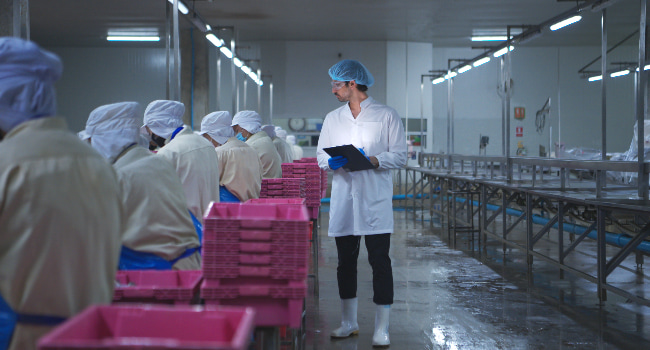
Temperature and Humidity Control
Temperature control is important in managing rooms with perishable items. The safety and quality of things like dairy and meat depend on keeping the right inventory levels and temperatures. If it gets too hot or cold unexpectedly, these items may spoil. This can hurt the supply chain and make it hard to see what products are good to use.
Keeping the right moisture in the room is also important. Too much water in the air can cause mold and ruin storage of items. Some advanced systems help keep track of both temperature and humidity. They send alerts to workers so they can act fast if something changes.
Besides using technology, best practices say that employees need to help check and track these things, too. When all the people and technology work together, good control of temperature and humidity makes it easier to store perishables the right way in a warehouse.
Preventing Cross-Contamination
Cross-contamination is a big problem in many warehouses, where goods with different needs are close to each other. By using strong warehouse management systems and good best practices, you can lower this risk.
The main thing to do first is to keep items apart. For example, meat needs a separate space from fruits or dairy to be safe. Next, make sure that cleaning happens between the use of these spaces. This helps stop any powder or bits from mixing.
It is smart to have rules, like using different tools in different spaces and washing things on a set schedule. Doing this makes customers feel good and keeps warehouse standards high. Working hard to avoid cross-contamination is a way to put safety and quality over all else and helps with good customer service.
Addressing Mold, Bacteria, and Pest Issues
Mold, bacteria, and pests can always be a problem in places where you store perishable goods. Regular warehouse cleaning gets rid of extra moisture and old food, which stops these problems from starting.
Specialized cleaning services will clean hard-to-reach spots and focus on getting rid of bacteria and fungus in all parts of the storage area. The use of monitoring tools helps find pests early, so you can act fast with pest control and fix the issue.
Keeping up with this kind of work not only boosts customer service but also helps meet health authority rules. A safe and clean space gives trust and helps perishable room workers do a good job.
Equipment and Tools for Effective Cleaning
Advanced technology and the use of special tools are changing how warehouse cleaning is done. These tools are made to fit places where you keep fresh or easily spoiled items. They help make sure the fulfillment process is smooth and meet health rules.
Also, machine-powered cleaning, like automated scrubbers, makes cleaning faster. It cuts down on mistakes people might make when they clean by hand. When you use these advanced tools, your own warehouse stays very clean. This helps keep stock levels steady and lets work go on without problems. Reliable cleaning tools help your warehouse stand out. They let you show others what good cleaning and care look like.
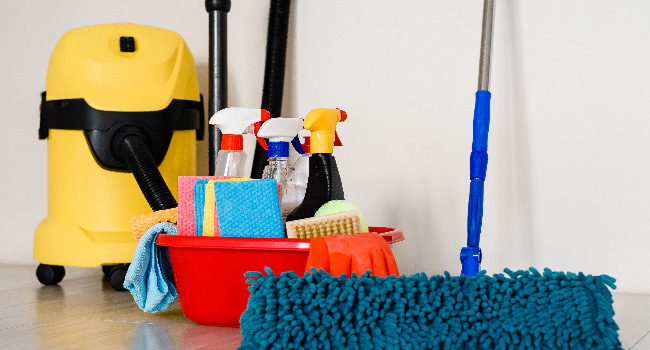
Specialized Cleaning Agents for Food Safety
Cleaning agents used in rooms where food can spoil are not made for just any task—they are made with food safety as the main goal. These cleaning solutions get rid of anything left behind from products. They also help make sure that no dangerous chemicals stay in the storage areas.
Antibacterial and eco-friendly agents are very helpful for keeping supply chain operations safe. These cleaners kill germs but do not hurt the items kept in storage. To get the best results, service providers suggest using agents that fit each type of item like dairy or meat.
When you use the right cleaning agents with the latest cleaning methods, it helps meet safety rules. This also supports a more safe and smooth supply chain process.
Choosing the Right Tools for Different Products
Choosing the right tools for cleaning is important to keep proper sanitation in a warehouse. This helps create a safe place to work. Different products like dairy or meat need their own cleaning equipment. Each one has a different chance for spoilage or contamination. For example, it is good to use high-pressure washers for cleaning meat areas. These help get rid of blood and fats. However, when cleaning softer things like bananas, it is better to use non-abrasive tools. These are more gentle on the fruit. Knowing what each product needs will help a warehouse keep better inventory management. It also helps warehouse operations run well. This makes customers happy and gives everyone good customer satisfaction.
Automated vs. Manual Cleaning Solutions
Choosing between using automated or manual cleaning affects how well you get things done in places that handle fresh goods. Automated cleaning systems help make warehouse operations smoother. They let you cut down on labor costs and keep the same cleaning standard for foods like dairy, meat, and produce. But manual cleaning gives you more flexibility. Workers can act fast when they see a problem or find specific spots that are dirty.
Both methods have good points. Automation makes inventory management faster and helps you save on costs. Manual cleaning is better for small jobs where you need someone to check carefully. In the end, the best choice comes down to what kind of cost savings you need and how much care is needed for product safety and customer satisfaction.
Dairy Room Cleaning Best Practices
Keeping dairy rooms clean is important to keep good product quality. It also helps keep customer satisfaction high. Best practices start with a regular cleaning plan. This plan should use proper sanitation and advanced technology that work for milk, cheese, and other dairy products. People need to pay close attention to spills and leftover messes. There should be routine checks of stock levels and inventory management to keep things in order. A warehouse management system can help with the process. It will help keep all health rules in place, so the entire supply chain stays safe from things that could contaminate or spoil dairy items.
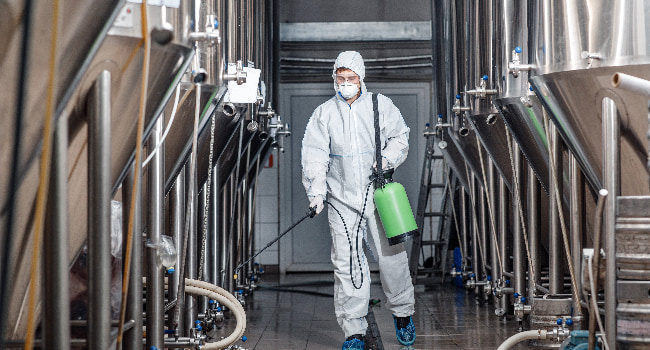
Handling Spills and Residue from Milk and Cheese
Handling spills from dairy products like milk and cheese is important to keep proper sanitation. Using cleaning tools with advanced technology helps make this job faster and easier. It also helps with good inventory management and smooth order fulfillment. When you check the cleaning equipment often and clean up right away, you lower the chance of cross-contamination. This is good for the customer experience.
It is best to use good habits in spill management, such as keeping waste apart and throwing it away the right way. These steps help protect the entire supply chain and the resources in it. It can also help the business get the most from its profit margins. Proper sanitation affects logistics operations in a good way. It helps make warehouse operations go well and keeps the supply chain running smoothly.
Sanitizing Storage Racks and Containers
Keeping storage racks and containers clean is very important, especially in a food and beverage warehouse. You need to use the right cleaning products that are safe for places food touches. This is the best way to kill any harmful germs. Cleaning things in the warehouse often helps keep customer satisfaction high. It gets rid of the risk of contamination, so your items stay safe, and it protects the inventory.
Setting up a regular plan to clean can also cut down on downtime in logistics operations. This means you can work without many stops, and order fulfillment goes smoothly. When you spend time and money on good warehouse cleaning and proper sanitation, you boost productivity for everyone. It also helps your supply chain stand out from others and gives you an edge over your competition.
Preventing Odor and Spoilage in Dairy Environments
Keeping things very clean in dairy areas is important. It helps stop bad smells and spoilage. You should check and manage stock levels often. Older products are more likely to go bad first. Using warehouse cleaning services with advanced technology for warehouse cleaning can help a lot. These services can remove bad smells and keep your inventory safe.
It is also important to have good ventilation systems. Temperature controls help stop bad smells from staying in the area. Plus, using a warehouse management system can help you watch inventory levels easily. This system makes sure you rotate products so the older ones go out first. In this way, you support customer satisfaction and reduce waste.
Meat Room Cleaning Protocols
Maintaining a clean meat room is very important for food safety. Good cleaning steps help lower the risk of harmful germs by getting rid of blood, fats, and proteins. Using the right cleaning products and tools makes it less likely for pathogens to spread. It is important to clean all surfaces well, like cutting boards and equipment.
Having regular checks and sticking to cleaning rules helps your team work better. It also helps you follow health laws, which can make customers trust you more. Giving staff the right training helps speed up the order fulfillment process and keeps good service levels for logistics operations. This makes the whole fulfillment process run smoothly and helps everyone do their job better.
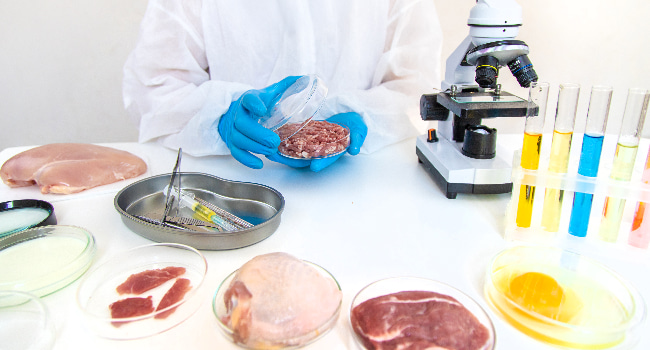
Removing Blood, Fats, and Proteins Safely
The removal of blood, fats, and proteins is very important to keep things clean in a meat room. You have to use the right cleaning tools made for this job. Tools like high-pressure washers and bio-enzymatic cleaners can help a lot. If you clean in a set way, you can make sure that all places—like cutting boards and equipment—are well cleaned. This helps stop germs from spreading. It also helps with proper sanitation and keeps away bad smells. Doing this makes it easier to manage your inventory levels and stay in line with the right health rules. All of this leads to better customer satisfaction and a better customer experience.
Disinfecting Cutting Surfaces and Equipment
Keeping things clean in a food and drink warehouse is very important, especially for cutting surfaces and different tools. You need to use the right cleaning products that are safe for places where food touches. This helps get rid of germs in a safe way. By cleaning on a regular schedule, you lower the chance of contamination, and you also help with better logistics operations and inventory management. It is very important to follow the best practices that health rules talk about. This keeps the area clean, helps things run better in the supply chain, and leads to higher customer satisfaction.
Managing Pathogen Risks Specific to Meat
To lower the risk of germs in places where you store meat, you need to know a lot about both how the body works and how warehouses run. Setting up a good cleaning plan is key. This means paying close attention to how the meat and the space around it mix. You should clean often. Try to use advanced technology to watch for things that could ruin the meat or make people sick. This helps you see what is happening in your supply chain. It helps to build good food safety steps.
Also, a tidy warehouse is better for inventory management. This lowers the chance that things will touch by mistake, so you get less cross-contamination. If you keep an eye on stock levels, order fulfillment will work better. When stock is safe, you protect people’s health. That is very important for any successful logistics provider.
All these things, from using advanced technology to keeping supply chain visibility high, help your supply chain run smooth. It lets you give the best service to your customers.
Bananas and Ethylene-Sensitive Produce Cleaning
It is very important to keep the place where you store bananas and other ethylene-sensitive produce clean. This helps keep them fresh for a long time and stops them from going bad too soon. When you use clear cleaning steps in the ripening rooms, you make your product development better and your customer experience stronger. Watch the amount of ethylene during cleaning, because even small changes can cause the bananas to ripen too fast or too slow. Using advanced technology and following best practices when you clean the supply chain will guard your stock levels, look after the health of everyone, and lead to cost savings for you over time.

Controlling Ethylene Exposure During Cleaning
Lowering ethylene during cleaning is very important if you want to keep special products fresh. Using the right equipment that stops ethylene from getting out can make your warehouse operations much better. This is how you help bananas and other things that do not do well with ethylene to avoid getting ripe too soon.
Good ventilation and smart cleaning schedules are key parts of your logistics services. These steps help in handling your stock levels well and stop cleaning chemicals from causing trouble in your supply chain. If you use these best practices, your inventory management gets better. In the end, this leads to a better customer experience.
Cleaning Procedures for Ripening Rooms
Effective cleaning steps for ripening rooms help make sure storage is just right. First, take out all ethylene-sensitive foods. Next, clean every surface and corner well. Use commercial cleaning services that follow food safety rules. During cleaning, advanced technology can be used to keep an eye on humidity and temperature. This step is key for proper sanitation. Once you finish cleaning, do a full check of warehouse operations to keep the quality of products high. Regular cleaning, using best practices, helps with inventory management and cost savings. It also raises customer satisfaction because people get better products.
Preventing Fungal Contamination in Banana Storage
Keeping bananas in a place without any fungicide is important if you want to keep their quality while they sit in storage. If you make sure there is good air flow, you can slow down the growth of fungus in the area. You should also keep the right amount of humidity to help control how wet the bananas get. Checking your stock levels often means that ripe bananas get handled or sent out quickly, and this stops them from going bad. If you keep bananas that do not react well to ethylene in their own space, it helps with inventory management. Using natural cleaning products when you do warehouse cleaning is good for sanitation and does not leave any harmful chemicals behind. This is good for warehouse cleaning services and helps protect the customer experience, which is very important every time an order is sent out.
Beyond the Basics: Cleaning Other Perishable Zones
Putting strong cleaning steps in place in areas where you keep seafood and fish is very important. It helps you keep your products safe and also keeps your customer satisfaction high. When you use proper sanitation, you lower the chances of things going bad or getting dirty, and you make sure you are following food safety rules.
Fresh produce and vegetables need cleaning done in a way that fits them. This is so you do not mix things up and can keep everything in good shape. When you store frozen goods and ice cream, it is important to watch the temperature while you clean. This way, you take care of the inventory levels at all times.
If you use these best practices, you will see better supply chain operations. It also helps your whole warehouse work better. Proper sanitation supports all parts of the supply chain and makes your day-to-day work go well.
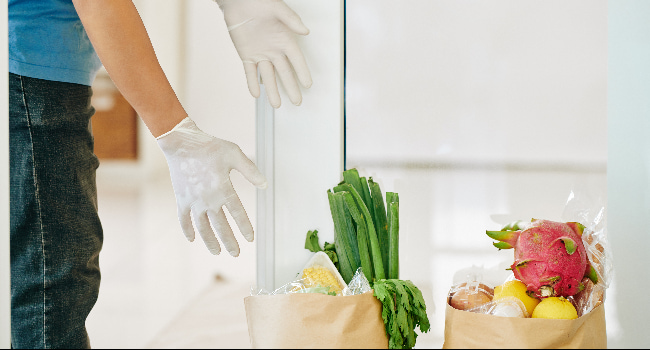
Seafood and Fish Storage Areas
Choosing the right tools to clean seafood and fish storage spaces is important. You need to keep things clean and stop germs from spreading. You should use the right brushes, soft sponges, and cleaning products made for marine use. These help keep the area free of bad germs. It is also good to follow proper inventory management steps. This means you always check stock levels to stop food from spoiling. It helps you work better, too.
Using advanced technology, like warehouse management software, can make cleaning easier. It also gives you better supply chain visibility. With this, warehouse workers can keep high service levels. It helps you give customers fresh products. That leads to good customer satisfaction.
Fresh Produce and Vegetable Rooms
Choosing the right tools for fresh produce and vegetable rooms helps keep them clean and can make the products last longer. Using soft-bristle brushes or microfiber cloths keeps the items from getting hurt and does a good job of getting rid of dirt and left-over stuff. High-pressure water jets are also good because they clean the surfaces well without leaving chemicals that could mix with your food. This can help your business meet health rules.
You need to check your cleaning tools often and change them when needed. This stops cross-contamination and keeps the cleaning process running well. If you set up good systems, you can improve the logistics operations involved in perishable inventory management. This way, you help protect the quality of your vegetables and keep the right stock levels for your customer base.
Frozen Goods and Ice Cream Storage
Taking care of frozen goods and ice cream means you have to keep things clean in the right way. This helps keep the products safe and keeps them tasting good. Cleaning well is important to stop anything from getting in the products that should not be there. This is a big part of making sure customers are happy and giving them a good customer experience.
You need to check storage temperatures often. This, along with managing inventory the right way, helps control stock levels and stops food from going bad. Using advanced technology can help make cleaning faster and manage the supply chain better. This also helps with supply chain visibility, so you can do order fulfillment in the best way.
Having special storage for every type of frozen product also keeps the cleaning easy and the foods safe. It makes the most out of the warehouse space and helps everything work well for the business. All of this adds up to proper sanitation and smooth daily work.
Staff Training and Safety in Perishable Room Cleaning
Making sure that all warehouse workers know the best practices for cleaning in rooms where you keep perishable items helps the whole supply chain run better. Training should teach people the right way to use and wear personal protective equipment (PPE). Workers also need to learn how to handle cleaning chemicals the right way and why good hygiene is so important to keep inventory safe. When you show employees how to work safely, they feel sure about what they do, even when the cleaning rules are hard. With regular training and certificates, people keep getting better and stay up to date with new ways and technologies. Focusing on training helps make the supply chain and supply chain operations stronger and brings better customer satisfaction.

Personal Protective Equipment (PPE) Requirements
Ensuring a safe cleaning space depends on the right use of personal protective equipment or PPE. Workers need to wear gloves, masks, and eye protection to cut down risk from harmful chemicals and biohazards. Following best practices for using PPE makes things safer for everyone. It also shows you care about health standards. Giving staff the right training on PPE helps keep warehouse operations safe. This will support employee well-being and help customer satisfaction. When you focus on proper sanitation and keep workers safe, you help build trust in the supply chain.
Proper Handling of Cleaning Chemicals
Making sure cleaning chemicals are handled safely is very important to keep a food and beverage warehouse clean. Training warehouse workers about chemical safety helps everyone follow best practices. This lowers the chance of problems when they are around these chemicals. Using the right personal protective equipment (PPE), such as gloves and masks, helps keep workers safe. It also protects the products in the warehouse.
Having a planned way to store and label chemicals in the inventory management system keeps everyone in line with the rules. This makes the warehouse a safer place to work, and it helps improve the way warehouse operations run.
Ongoing Training and Certification Needs
Effective cleaning in food and beverage warehouses needs regular training and certification for the staff. When you engage your team in training, they learn to focus on safety and follow good hygiene every day. Certification programs also help workers understand the best ways to do inventory management and keep things clean, especially when they deal with goods that can spoil.
It is also important to let staff know about new advanced technology and cleaning methods. This ongoing learning can help make warehouse operations better. There will be less risk, the fulfillment process can run smoother, and customers get better service. Using best practices like this leads to higher service levels and cuts down on the risk of contamination, which helps boost customer satisfaction.
Conclusion
Effective cleaning in perishable rooms is key to keeping your products safe and making sure your customers are happy. When you use best practices, you meet health rules and make your supply chain operations and logistics services run smoother. As demands rise in the fulfillment process, paying close attention to warehouse cleaning helps cut down on spoilage and improves inventory management. Using advanced technology and sticking to proper sanitation helps companies run better. This improves customer satisfaction, boosts profit margins, and gives a strong competitive advantage. It also makes the customer experience better, which helps the business succeed.
Frequently Asked Questions
How often should perishable rooms be cleaned in food facilities?
Perishable rooms in food facilities need to be cleaned every day. This helps to keep up hygiene and stop cross-contamination. Some high-risk areas, like meat and dairy rooms, should be cleaned several times in one day. Other areas that are not as risky may be fine with cleaning only once a week. Regular checks are also needed to make sure the place stays clean.
Can eco-friendly cleaning products be used in perishable rooms?
Yes, the use of eco-friendly cleaning products in places where things can spoil quickly, like food rooms, can work well. These products help cut down on the amount of bad chemicals left behind. They also keep things clean and safe. But, it is important to check that these cleaning products are safe to use around food. You also have to be sure they can fight the germs usually found in dairy, meat, and produce areas.
How do you prevent cross-contamination during cleaning?
To stop germs from spreading while you clean, make sure you use separate tools for each area. Always start cleaning at the spot that is least dirty and then move to the more dirty spots. You should change your cleaning cloths often. Also, wipe down all your tools with a cleaner after each use. This will help cut down on the risk of spreading germs from one spot to another, especially where there is perishable stuff.

Haley serves as the Marketing Manager for A1 Quality Logistical Solutions. She joined A1QLS in 2023 with her prior experience gained with GXO and XPO Logistics.
